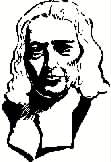Heroes of the Faith
Concise stories of significant Christian leaders
Concise stories of significant Christian leaders

 John Wesley
John Wesley1703-
————————————————————————
John Wesley was the child of a rectory, the fifteenth son of Samuel and Susanna Wesley. He was educated at Oxford and ordained a priest.
Much of his early life was his own spiritual quest. His Journal gives the reasons he was going to the American colony of Georgia in 1735. "Our end in leaving our own native country was not to avoid want, God having given us plenty of temporal blessings, nor to gain riches and honour, but simply this - to save our souls, to live wholly to the glory of God."
Wesley's idealism received some heavy blows in America. He returned to England disillusioned in January 1738, expressing his personal uncertainty more clearly than ever - "I went to America to convert the Indians, but oh, who will convert me? Who, what is he that will deliver me from this evil heart of unbelief?"
The climax of his personal quest came on 24th May 1738. "In the evening, I went, very unwillingly, to a society in Aldersgate Street where one was reading Luther's Preface to the Epistle to the Romans. About a quarter before nine, while he was describing the change which God works in the heart through faith in Christ, I felt my heart strangely warmed. I felt that I did trust in Christ, Christ alone, for salvation; and an assurance was given me that he had taken away my sins, even mine, and saved me from the law of sin and death."
That evening marked the turning-point in his life. The personal faith in Christ to which he had come had now to be shared with others.
He came into conflict with representatives of the Established Church, because he believed he had an extraordinary commission from God to evangelise Great Britain. In fact, he regarded the whole world as his parish.
Wesley was tireless as he pursued his task. For fifty years he travelled an average of 8000 kilometres a year, mainly on horseback, rising at 4.00 am, filling every moment with work and living frugally. He preached some 40,000 sermons. The number of hymns he and his brother Charles wrote ran into thousands.
Wesley instructed his helpers, "You have nothing to do but to save souls. Therefore, spend and be spent in this work."
When Wesley spoke about "saving souls", he was emphasising evangelism and personal conversion, but was also relating to whole people, in their lives, environment and society.
Before his conversion, Wesley had been for a time the leader of a group in Oxford nicknamed the Holy Club. It was a society for spiritual improvement. Its members were committed to a rigorous discipline. In addition to spiritual exercises, this included visiting prisoners, relieving the poor and maintaining a school for neglected children.
Following his conversion, Wesley continued to be involved with the practical needs of people. In fact, his care for people deepened and his insight into their problems sharpened. We find him setting up schools and conducting medical clinics. We hear him speaking out against slavery and against war. He continued to visit the prisons and sought to arouse the national conscience on the state of the prisons.
Secular historians have commented that the impact of the revival that swept England in Wesley's time was so strong and deep that a revolution such as occurred in France was averted in England.